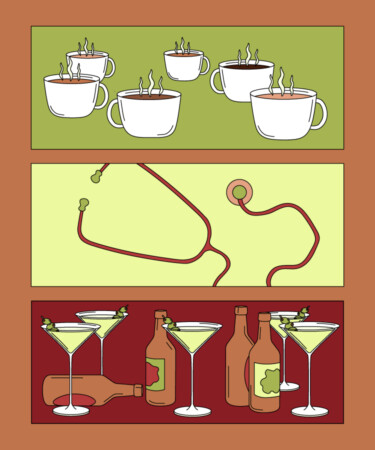It’s a late night out, several drinks later you find yourself more inebriated than intended, and you feel the unmistakable symptoms of intoxication come about. Thinking of your commute home, you may consider grabbing a strong, piping-hot cup of coffee as a way to sober up. But why?
Perhaps it’s because this scene, which has been played out in countless TV shows and movies, has fostered the idea of using coffee to cancel out the effects of drinking.
It’s a bewitching thought that coffee, or more specifically caffeine, can alleviate the side effects of alcohol. Yet it’s a solution that many drinkers continue to resort to when ending a night out. To sort out the facts and fiction behind this perceived remedy, VinePair spoke with Nicole Sohayegh, a registered dietitian and culinary nutritionist of New York City Nutrition.
Understanding how caffeine and alcohol affect the body is the first clue in demystifying the potential sobering effects of coffee. As most of us well know, alcohol is a depressant and caffeine is a stimulant. While depressants slow the rate of the body’s functions, stimulants increase bodily activities, such as heart rate, and make drinkers feel more energetic.
Studies have shown that consuming alcohol increases the body’s levels of adenosine, a naturally produced chemical that tends to induce sleep, while caffeine inhibits them. As a result, combining these two beverages can confuse the nervous system and ultimately be quite dangerous.
Drinking coffee when you’re intoxicated — even decaf — introduces caffeine into your system, causing a series of reactions. “Coffee can mask the effects of alcohol,” says Sohayegh. Often, this leads the individual to believe they are sober and therefore alert enough to perform potentially dangerous tasks that require a lot of attention. (It can also give way to excessive drinking and the potential risk of alcohol poisoning.) But while coffee masks the effects of drinking, it does not reduce the levels of alcohol in a person’s bloodstream, and therefore does not sober you up.
As for the next day, many drinkers will turn to coffee to relieve the side effects of intoxication. In these situations, too, coffee is not the miracle cure some believe it to be, and better options abound.
Both alcohol and coffee dehydrate the body so focusing on hydration is key for recovery, Sohayegh explains. This means not only drinking water but loading up on liquids that will boost electrolytes in order to replenish the body. She also warns against not eating, which can easily fall by the wayside during a night out. “It’s important to make sure to focus on whole foods such as fresh fruits, vegetables, nuts, and seeds,” Sohayegh adds. Maintaining a nutritious diet can be essential for your body’s recovery.
However, if your system is not quite ready to handle solid foods during the morning after, Sohayegh recommends trying a fresh green juice with green tea instead of coffee. “Green tea has smaller amounts of natural caffeine, but also contains antioxidants and L-theanine that will help you feel better faster.”
